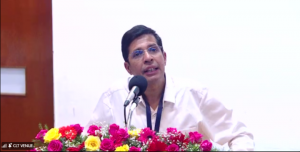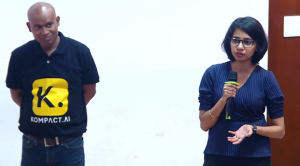India’s #1 Institute IIT Madras partners with US-based Startup to develop AI Models to solve grassroots challenges
Ziroh Labs has optimised 17 AI models, including DeepSeek, Qwen & Llama, on CPUs, instead of GPUs, making AI more accessible, scalable, cost-effective
CHENNAI, INDIA, May 11, 2025 /EINPresswire.com/ -- Indian Institute of Technology Madras (IIT Madras) is partnering with Ziroh Labs, a California-based Innovation-driven Deep-Tech Startup, and IITM Pravartak Technology Foundation to establish an AI Centre of Excellence to solve India’s grassroots challenges. this Centre will develop practical, efficient AI solutions for real-world challengesIn a major step towards making AI Models solve grassroots problems, Ziroh Labs unveiled the first version of ‘Kompact AI at IIT Madras recently. Kompact AI is an AI platform that enables foundational models to be built and served using CPUs without requiring GPUs (Graphics Processing Units, which are expensive and hard to obtain).
Ziroh Labs has already optimised 17 AI models, including DeepSeek, Qwen and Llama, to run efficiently on CPUs. These models have been benchmarked with IIT Madras, evaluating both quantitative performance and qualitative accuracy. For the first time, high-performance AI is built and deployed efficiently on CPUs, making AI more accessible, scalable, and cost-effective.
Kompact AI enables models to be deployed over CPUs without sacrificing quality and at least 3x performance than the current state of the art, thereby providing GPU-like scale and speed.
Elaborating on the need for such developments, Prof. V. Kamakoti, Director, IIT Madras, said, “This effort by Ziroh lab and IITM Pravartak is a nature-inspired one wherein they provide a platform that uses customized and trained domain-specific models to provide accurate inferences on affordable conventional compute machines. This effort is certainly a major step in arresting the possible AI divide between one who can afford the modern hyper scalar systems and one who cannot.”
This AI platform aims to democratise AI by allowing developers across the globe to build, train and infer AI using CPUs commonly found in Cloud Data Centers and Edge Devices. Kompact AI enables AI development without violating any data privacy and data residency regulations across the globe.
Kompact AI can play a transformative role as it leverages multiple optimisations algorithmically and implementation-wise to execute models on the low end without any support required for external communication, such as the Internet. As a part of this upcoming CoE, IIT Madras will work on smaller AI models for specific use cases, leveraging Kompact AI to optimise execution, making high-performance AI more efficient, accessible, and relevant to real-world applications.
CRITICAL NEED
AI development is currently dominated by ‘Big AI’—massive, general-purpose models designed for scale. While powerful, these models often fail to address India’s grassroots challenges as they demand extensive computing power, energy and infrastructure, making them costly and inaccessible to communities at the bottom of the pyramid.
Specific use cases such as aiding farmers, supporting students or assisting frontline workers in rural areas are best served by smaller, task-specific AI models that can run efficiently on smartphones and low-power devices, ensuring accessibility where it matters most.
While porting Foundational Models to CPUs is not new, it is seen that most models running on CPUs are small, quantised or distilled versions of the original mode
ABOUT IIT MADRAS
Indian Institute of Technology Madras (IITM) was established in 1959 by the Government of India as an ‘Institute of National Importance.’ The Institute has been ranked No.1 in the ‘Overall’ Category for the sixth consecutive year in India Ranking 2024 released by National Institutional Ranking Framework, Ministry of Education, Govt. of India & No.1 in the ‘Engineering Institutions’ category in the same Rankings for nine consecutive years – from 2016 to 2024.
Bhavani Veeravalli
Footprint Global Communications
bhavani.giddu@footprintglobal.com
Visit us on social media:
LinkedIn
Instagram
Facebook
YouTube
X
Legal Disclaimer:
EIN Presswire provides this news content "as is" without warranty of any kind. We do not accept any responsibility or liability for the accuracy, content, images, videos, licenses, completeness, legality, or reliability of the information contained in this article. If you have any complaints or copyright issues related to this article, kindly contact the author above.
Hollywood Life Names MindStir Media the Top Hybrid Publisher in America
NCRI-US Cites the Joint US-European Statement on the Iranian Regime’s State-Sponsored Threats, Calls for Accountability
Western Outdoor Supply Highlights Top Trends in Outdoor Living for Colorado Springs Residents
Więcej ważnych informacji
 Jedynka Newserii
Jedynka Newserii

 Jedynka Newserii
Jedynka Newserii

Konsument

Grupa nowych biednych emerytów stale się powiększa. Ich świadczenie jest znacznie poniżej minimalnej emerytury
Przybywa osób, które z powodu zbyt krótkiego czasu opłacania składek pobierają emeryturę niższą od minimalnej. Tak zwanych nowych biednych emerytów jest w Polsce ok. 430 tys., a zdecydowaną większość grupy stanowią kobiety – wskazują badania ekspertów Instytutu Pracy i Spraw Socjalnych. W ich przypadku krótszy okres składkowy zwykle wynika z konieczności opieki nad dziećmi lub innymi osobami w rodzinie. Wśród innych powodów, wymienianych zarówno przez panie, jak i panów, są także praca za granicą lub na czarno oraz zły stan zdrowia.
Media i PR
M. Wawrykiewicz (PO): Postępowanie z art. 7 przeciw Węgrom pokazało iluzoryczność tej sankcji. Unia wywiera naciski poprzez negocjacje nowego budżetu

Przykład Węgier pokazał, że procedura z artykułu 7 traktatu o UE o łamanie praworządności nie ma mocy prawnej z powodu braku większości, nie mówiąc o jednomyślności wśród pozostałych państw członkowskich. Negocjacje nowego budżetu UE to dobry pretekst do zmiany sposobu części finansowania z pominięciem rządu centralnego. Czerwcowy marsz Pride w Budapeszcie pokazał, że część społeczeństwa, głównie stolica, jest przeciwna rządom Viktora Orbána, ale i na prowincji świadomość konsekwencji działań Fideszu staje się coraz większa przed przyszłorocznymi wyborami.
Firma
Blockchain zmienia rynek pracy i edukacji. Poszukiwane są osoby posiadające wiedzę z różnych dziedzin

Zapotrzebowanie na specjalistów od technologii blockchain dynamicznie rośnie – nie tylko w obszarze IT, ale również w administracji, finansach czy logistyce. Coraz więcej uczelni wprowadza programy związane z rozproszonymi rejestrami, które wyposażają studentów w umiejętności odpowiadające wymogom rynku.
Partner serwisu
Szkolenia

Akademia Newserii
Akademia Newserii to projekt, w ramach którego najlepsi polscy dziennikarze biznesowi, giełdowi oraz lifestylowi, a także szkoleniowcy z wieloletnim doświadczeniem dzielą się swoją wiedzą nt. pracy z mediami.



![Nestlé w Polsce podsumowuje wpływ na krajową gospodarkę. Firma wygenerowała 0,6 proc. polskiego PKB [DEPESZA]](https://www.newseria.pl/files/1097841585/fabryka-nesquik_1,w_85,r_png,_small.png)






.gif)

 |
| |
| |
|